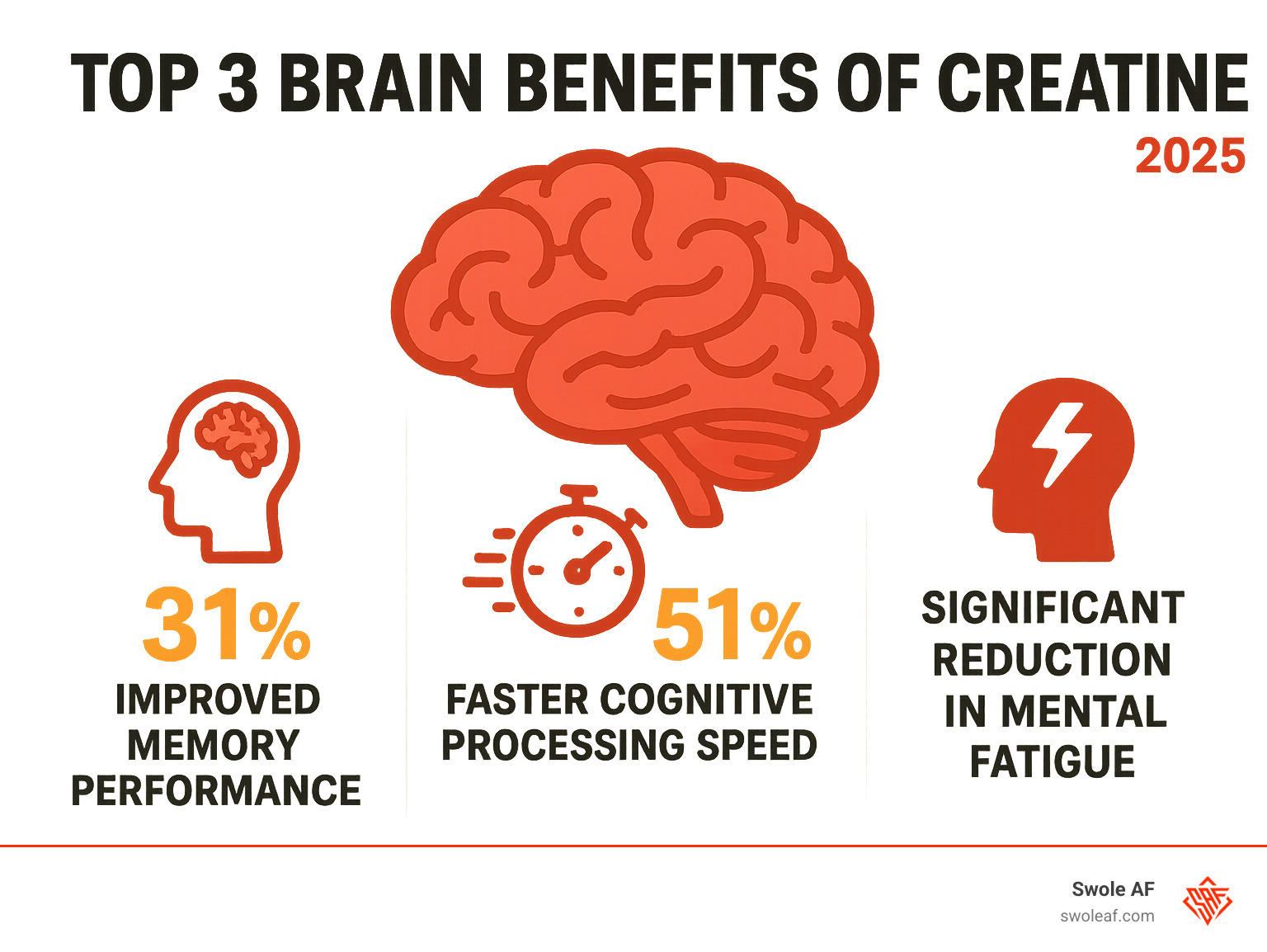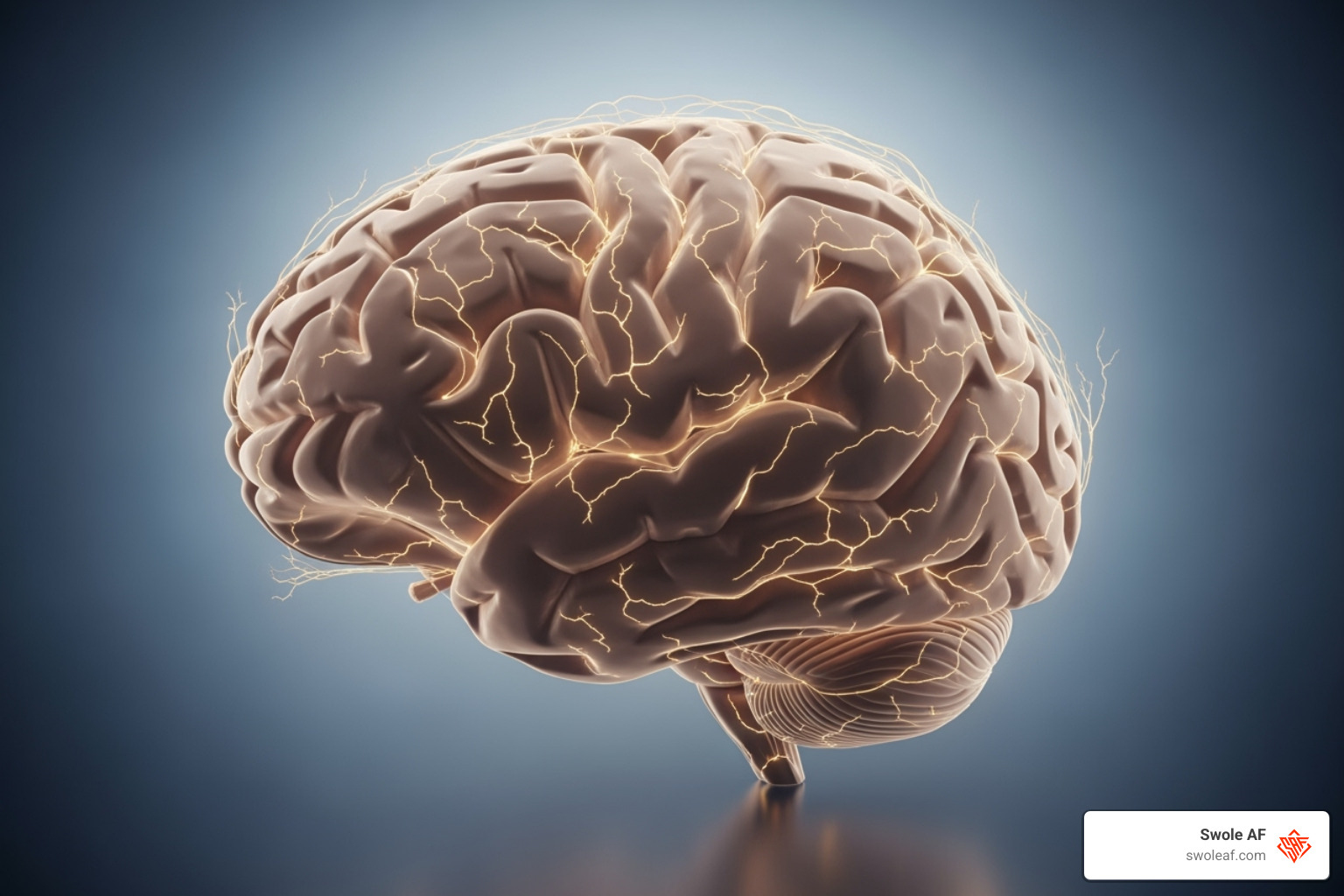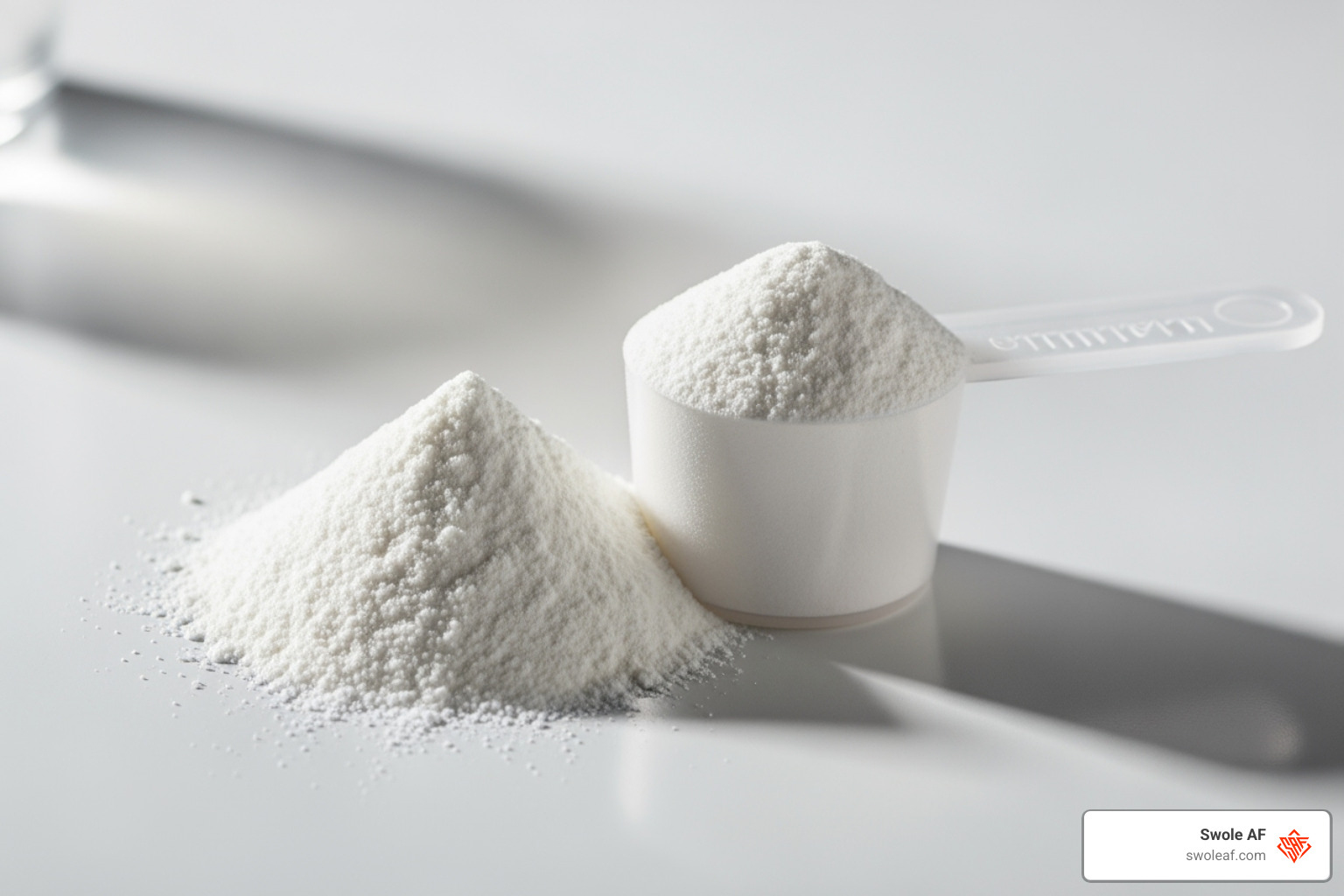Why Creatine and Brain Health is More Than Just Muscle Talk
Creatine and brain health research is revealing what athletes have suspected for years – this powerhouse supplement doesn’t just fuel your muscles, it boosts your mind too.
Quick Answer: Key Benefits of Creatine for Brain Health
- Memory Improvement: 31% improvement in memory tasks (research-backed)
- Faster Processing Speed: 51% improvement in cognitive processing
- Reduced Mental Fatigue: Maintains brain energy during demanding tasks
- Better Attention: 31% improvement in attention span
- Sleep Deprivation Protection: Prevents cognitive decline when sleep-deprived
- Mood Support: Emerging evidence for depression and anxiety relief
Your brain burns through energy faster than any other organ in your body. While it’s only 2% of your total weight, it devours up to 20% of your available energy. Just like your muscles during an intense workout, your brain needs rapid energy replenishment to perform at peak levels.
The science is clear: creatine doesn’t just help you push more weight in the gym. It helps you think faster, remember better, and stay mentally sharp when stress and fatigue try to slow you down. Studies show significant improvements in memory, processing speed, and attention – especially when you’re pushing your limits.
This isn’t about becoming a genius overnight. It’s about giving your brain the same energy advantage you give your muscles. Whether you’re strategizing your next training cycle, staying focused during long study sessions, or maintaining mental clarity under pressure, creatine works behind the scenes to keep your cognitive engine running smoothly.
I’m Jonas Muthoni, and over my 15+ years in the wellness industry, I’ve seen how creatine and brain health research has evolved from promising theory to solid science. My work with health brands has shown me that the athletes who understand both the physical and mental benefits of supplementation consistently outperform those who don’t.

Understanding Creatine: The Body and Brain’s Energy Currency
Creatine is a natural compound that plays a vital role in our body’s energy production, especially in tissues with high energy demands like our muscles and brain. It’s truly our body’s internal energy currency.

What is Creatine?
At its core, creatine is an amino acid derivative. This means it’s built from three other essential amino acids: arginine, glycine, and methionine. Our bodies naturally produce creatine, primarily in the liver, kidneys, and pancreas. From there, it’s transported to our muscles and brain, where it’s stored for later use.
While the majority of our body’s creatine, about 95%, is stored in our skeletal muscles, a crucial 5-10% finds its home in the brain. This small but mighty portion is incredibly important because, as we mentioned earlier, our brain has an exceptionally high energy demand. It’s constantly working, even when we’re resting, powering everything from our thoughts and memories to our emotions and movements.
How Creatine Fuels Brain Cells
The magic of creatine lies in its ability to regenerate adenosine triphosphate (ATP), often referred to as the “energy currency” of our cells. When our cells need energy, ATP is broken down. Creatine helps quickly convert adenosine diphosphate (ADP) back into ATP through a system known as the phosphocreatine (PCr) system. Think of it like a rapid-charge battery for our cells.
In the brain, this ATP-PCr energy system is crucial for rapid energy supply, supporting neuronal activity and maintaining cellular energy homeostasis. Neurons, the building blocks of our brain, require a constant and immediate supply of energy to fire signals, process information, and maintain their structural integrity. When brain cells are under stress, or facing high demands, the phosphocreatine system kicks in, providing a quick burst of energy to keep things running smoothly. This rapid energy provision and buffering capacity are key to creatine’s potential as a cognitive improver and neuroprotective agent.
Natural Sources vs. Supplementation
While our bodies produce creatine and we can get some from our diet, mainly from red meat, poultry, and fish, these natural sources often aren’t enough to meet our total requirements, especially for optimal brain function. For instance, vegetarians and vegans, who don’t consume animal products, tend to have lower creatine levels in their muscles and brains, making supplementation particularly relevant for them.
Supplementation offers a practical and effective way to increase creatine stores in both muscles and the brain. Studies show that oral creatine ingestion can significantly increase brain creatine levels, though the increase in the brain is typically smaller (around 5-10%) compared to what’s seen in muscles. This is because the brain has a protective barrier, the blood-brain barrier, and a specific creatine transporter (SLC6A8) that regulates how much creatine can enter.
However, even a modest increase can have a profound impact on brain energy dynamics. This is why many people turn to creatine supplements, like the high-quality creatine monohydrate we offer at Swole AF, to ensure their bodies and brains have ample energy reserves. For more details on the metabolic pathways, you can explore this resource: Metabolic basis of creatine in health and disease.
The Science-Backed Benefits of Creatine and Brain Health
The mechanisms by which creatine benefits the brain are largely rooted in its role as an energy buffer and neuroprotectant. By increasing brain phosphocreatine (PCr) levels, creatine ensures more efficient ATP recycling. This enhances mitochondrial function, the powerhouses of our cells, resulting in improved overall brain energy metabolism and providing crucial neuroprotection against various stressors.

How Creatine Improves Cognitive Functions like Memory and Reasoning
When it comes to boosting our brainpower, creatine has shown some impressive results in scientific studies. We’ve seen significant improvements across several key cognitive domains:
- Memory: Research indicates a notable positive effect on memory. A meta-analysis found that creatine supplementation led to a significant improvement in memory tasks (SMD = 0.31). This means subjects showed improved recall and learning abilities. Another study noted that creatine improved performance on tasks like the Word Memory Test (WMT).
- Faster Processing Speed: Our brains often need to work quickly, especially under pressure. Creatine has been shown to significantly improve processing speed time (SMD = -0.51), allowing for quicker decision-making and more efficient cognitive operations.
- Improved Reasoning Skills: Beyond just memory, creatine can also sharpen our reasoning abilities. Studies have reported improvements in intelligence and reasoning tasks following creatine supplementation.
- Better Attention: Staying focused is a challenge in our busy world. Creatine has demonstrated significant positive effects on attention time (SMD = -0.31), helping to improve concentration and sustained focus.
While some early studies had limitations, more recent systematic reviews, like the one found here: Systematic review of creatine’s cognitive effects, are consolidating the evidence, suggesting that creatine is indeed a valuable tool for cognitive improvement.
Combating Mental Fatigue and the Effects of Sleep Deprivation
We all know the feeling of mental fatigue – that brain fog that rolls in after a long day or a demanding task. Creatine steps in as a powerful ally, enhancing cognitive stamina and helping our brains perform under pressure.
During demanding mental tasks, especially those that deplete brain energy reserves, creatine can help maintain performance. But where it really shines is in combating the notorious effects of sleep deprivation. Sleep deprivation is a major culprit for cognitive impairment and metabolic changes in the brain, including drops in phosphocreatine (PCr/Pi) levels and pH. These changes signal an energy crisis in the brain.
The good news? Creatine has been shown to alleviate sleep deprivation-induced fatigue and improve cognitive performance. In a fascinating study, a single high dose of creatine (0.35 g/kg) was administered to healthy individuals undergoing 21 hours of sleep deprivation. The results were compelling: creatine prevented significant drops in pH level and changes in PCr/Pi that typically occur with sleep loss. It also significantly improved short-term memory tasks and reaction speed. This suggests creatine can act like a backup battery for your brain, preventing the energy drain that leads to cognitive decline when you’re running on fumes. You can dig deeper into this study here: Single dose creatine improves cognitive performance and induces changes in cerebral high energy phosphates during sleep deprivation.
This research is particularly exciting because it challenges the previous assumption that creatine supplementation requires weeks of consistent intake to show brain benefits. For acute stressors like sleep deprivation, a single dose might be enough to offer noticeable improvements.
Who Benefits Most from Creatine for Brain Health?
While research suggests creatine can offer cognitive benefits to many, certain populations may experience particularly pronounced effects:
- Vegetarians and Vegans: As we discussed, these individuals typically have lower baseline creatine levels due to their diet. Therefore, they often show more significant improvements in cognitive tasks, particularly memory, after creatine supplementation. If you’re following a plant-based diet, supplementing with creatine can help bridge this nutritional gap.
- Older Adults: As we age, brain creatine levels can decline, and cognitive functions naturally start to slow down. Studies have shown that creatine supplementation can improve cognitive performance in elderly individuals, including enhancing short-term memory and reasoning, and potentially offering neuroprotective benefits against age-related cognitive decline.
- High-Stress Individuals, Students, and Professionals: Anyone facing demanding cognitive tasks or periods of mental strain can benefit. Whether it’s pulling an all-nighter for an exam, managing a high-pressure project, or simply trying to stay sharp during a busy work week, creatine’s ability to combat mental fatigue and support brain energy makes it a valuable tool.
- Females: Interestingly, research suggests that creatine supplementation might be more beneficial for females in certain contexts. Women tend to have different creatine metabolism, influenced by hormonal fluctuations throughout their lives. This can lead to variations in creatine transport, bioavailability, and synthesis. For example, women may lose more creatine during menstruation, pregnancy, and menopause. This unique physiological profile could mean that women experience distinct benefits from creatine supplementation, especially for brain health.
- Individuals with Certain Medical Conditions: Creatine supplementation has shown promise in individuals with diseases that affect brain energy or function. This includes those with creatine deficiency syndromes, and emerging research is exploring its role in conditions like Long Covid, where brain fog and concentration difficulties are common symptoms.
Anyone looking to optimize their cognitive function, improve mental resilience, or support long-term brain health could find creatine to be a beneficial addition to their routine.
Creatine’s Role in Mood, Mental Health, and Neuroprotection
Beyond its direct effects on cognitive performance, creatine’s influence extends to our mood, overall mental well-being, and even long-term brain health through its neuroprotective properties. The link between brain energy and mood is becoming increasingly clear. When our brain cells lack sufficient energy, it can impact neurotransmitter function and lead to mood disturbances. Creatine helps by restoring and maintaining brain energy metabolism.

Potential for Depression and Anxiety Support
The scientific evidence supporting creatine’s role in mood regulation, particularly regarding depression and anxiety, is growing. One reason creatine might help people with depression is its significant role in energy production and usage within the brain. If creatine levels are low, this directly impacts the brain’s energy supply, which can in turn affect neurotransmitter levels and overall mood.
In a promising pilot study, individuals diagnosed with depression who were given creatine powder alongside a course of cognitive behavioral therapy (CBT) showed greater symptom improvement over eight weeks compared to those who received CBT alone. This suggests creatine can act as an effective adjunctive therapy, supporting conventional treatments. This finding may be especially important for vegans, as some research suggests this group might be at a higher risk of depression due to potentially lower dietary creatine intake. While more research is needed, particularly for anxiety, the initial findings are encouraging for creatine’s potential as a mental health support.
Neuroprotective Properties for Long-Term Brain Health
Creatine’s benefits extend beyond immediate cognitive and mood improvement. It also possesses significant neuroprotective properties, making it a subject of interest for long-term brain health and in the context of various neurological conditions:
- Traumatic Brain Injury (TBI) and Concussion: Creatine has shown promise in protecting the brain from the damage caused by TBI. Animal studies have demonstrated that creatine can reduce brain damage and improve outcomes after injury. In humans, preliminary studies suggest it may help prevent traumatic headaches, dizziness, and fatigue following concussions, particularly in children. Its ability to stabilize brain energy and act as an antioxidant likely contributes to these protective effects.
- Neurodegenerative Diseases: Research is exploring creatine’s potential in conditions like Huntington’s disease, Parkinson’s disease, and Amyotrophic Lateral Sclerosis (ALS). For example, creatine supplementation has been shown to lower brain glutamate levels in Huntington’s disease, which is important because excess glutamate can be toxic to brain cells (a phenomenon known as excitotoxicity). Creatine also offers protection against glutamate-induced nitrosative and oxidative stress, further bolstering its neuroprotective profile. While the research in humans for these conditions is ongoing and complex, the underlying mechanisms suggest a promising therapeutic role.
- Antioxidant Effects: Creatine’s protective antioxidant effect helps our bodies combat oxidative stress, a process that can damage cells, including brain cells, and contribute to aging and disease. By reducing oxidative stress, creatine helps preserve the integrity and function of brain tissue over time.
These neuroprotective mechanisms highlight creatine’s potential to not just improve current brain function but also to safeguard it against future damage and decline, offering a comprehensive approach to creatine and brain health.
How to Safely Supplement Creatine for Cognitive Improvement
When considering creatine for cognitive benefits, safety and proper usage are paramount. We at Swole AF believe in providing not just effective products but also clear, evidence-based guidance to help you make informed decisions.

Recommended Dosage and Methods
The most extensively studied and recommended form of creatine is creatine monohydrate. It’s widely available, affordable, and dissolves easily, making it a convenient choice. Our USA-made creatine monohydrate is a testament to our commitment to quality.
For general brain health and cognitive improvement, a daily maintenance dose of 3-5 grams of creatine monohydrate is typically recommended. This dose is well-tolerated by most healthy adults and is effective for saturating brain creatine stores over time.
While not strictly necessary for brain benefits, some individuals opt for a “loading phase” to more quickly saturate their creatine stores. This usually involves taking 20 grams per day for 5-7 days, divided into smaller doses (e.g., four 5-gram doses). After this initial phase, you would transition to the 3-5 gram daily maintenance dose.
When it comes to timing, consistency is more crucial than precise timing for brain health benefits. Unlike muscle performance where pre- or post-workout timing might offer slight advantages, for cognitive effects, simply taking your daily dose whenever it’s convenient is generally sufficient. We recommend taking it with plenty of water or a meal to aid absorption and minimize any potential stomach upset. Some studies suggest that taking creatine with carbohydrates can improve its uptake into cells, including brain cells, by stimulating insulin release.
Safety, Side Effects, and Common Myths
Creatine is one of the most well-researched supplements on the market, and its general safety profile is considered robust for most healthy individuals. However, like any supplement, it can come with some potential side effects, though these are typically mild and rare:
- Common Side Effects: The most frequently reported side effects include mild water retention (which can lead to slight weight gain, particularly in the initial loading phase), muscle cramping, and gastrointestinal upset such as nausea, vomiting, or diarrhea. If you experience GI issues, try dividing your daily dose into smaller amounts taken throughout the day.
- Kidney Health Myth: A common misconception is that creatine is bad for the kidneys. Extensive research has consistently shown that creatine supplementation is safe for healthy kidneys and does not cause kidney damage. However, if you have pre-existing kidney disease or liver disease, or if you are taking medications that affect kidney function, it is absolutely crucial to consult your doctor before starting creatine supplementation. Creatine may also increase the risk of mania in individuals with bipolar disorder, so medical consultation is vital in such cases.
- Importance of Hydration: Staying well-hydrated is key when supplementing with creatine. This helps your body process the supplement efficiently and can mitigate some of the minor side effects like cramping.
- Interaction with Caffeine: While generally considered safe to take together, some individuals report increased stomach upset when mixing creatine powder directly with coffee or other highly caffeinated drinks. If you’re sensitive, it might be best to take them separately.
We emphasize: Always consult your healthcare provider before adding any new supplement to your regimen, especially if you have underlying health conditions or are taking other medications. Your doctor can help determine if creatine is right for you and advise on the appropriate dosage.
Frequently Asked Questions about Creatine and Brain Health
We often hear questions about how creatine works for the brain, and we’re here to clear up some common curiosities.
How long does it take for creatine to improve cognitive function?
This is a great question, and the answer can vary depending on what you’re hoping to achieve. For general, long-term improvements in brain function, like memory, reasoning, and attention, it typically takes a few weeks to reach optimal brain creatine saturation. While muscle saturation can be achieved relatively quickly, the brain’s uptake is slower due to the blood-brain barrier. So, consistency is crucial here. We recommend sticking with your daily maintenance dose for several weeks before expecting noticeable effects.
However, for acute stressors like sleep deprivation, some exciting new research suggests that a single, higher dose of creatine can have almost immediate effects, improving cognitive performance within hours. This challenges the old assumption that only long-term loading phases yield benefits. So, whether it’s a marathon study session or just a particularly demanding day, creatine might offer quicker support than previously thought.
Can I get enough creatine for my brain from food alone?
While your body naturally produces some creatine, and you can get it from dietary sources like red meat and fish, it’s generally difficult to reach therapeutic levels for optimal brain health through food alone. The amount you’d need to consume to significantly boost brain creatine stores would be quite large, often impractical for most diets. For instance, preliminary studies suggest adults require around 1 gram of creatine per day just for basic needs, and lower intake has been linked to higher prevalence of certain disorders.
This is especially true for vegetarians and vegans, whose diets naturally lack creatine from animal sources, leading to lower baseline levels. For these individuals, supplementation is often the most practical and effective method for increasing brain creatine stores to a beneficial level. Think of it this way: while you can get some vitamin C from an orange, if you need a higher therapeutic dose, you’d likely turn to a supplement. Creatine for brain health works similarly.
Does creatine interact with caffeine?
This is a common concern for many of us who enjoy our morning coffee! The interaction between creatine and caffeine has been debated in research, with some conflicting findings. Generally, for most healthy individuals, it’s considered safe to take creatine and caffeine together. Many pre-workout supplements, including some of our own at Swole AF, contain both ingredients.
However, some people report mild gastrointestinal discomfort or stomach upset when mixing creatine powder directly with coffee or other highly caffeinated beverages, especially on an empty stomach. If you experience this, a simple solution is to take your creatine and caffeine at separate times, perhaps your creatine with a meal and your coffee later. As always, if you have any concerns or experience adverse reactions, we recommend consulting a healthcare professional for personalized advice.
Conclusion: A Powerful Tool for Your Cognitive Toolkit
As we’ve explored, the research on creatine and brain health is incredibly promising, extending far beyond its well-known benefits for muscle performance. From enhancing cognitive functions like memory, attention, and processing speed, to combating mental fatigue and the effects of sleep deprivation, creatine is proving itself to be a powerful ally for our brains. Its emerging role in mood support, particularly for depression, and its neuroprotective properties against various neurological conditions further solidify its potential as a comprehensive brain optimizer.
The scientific consensus is growing: while creatine’s ergogenic role in muscle is robustly established, the evidence for its cognitive benefits is strong and continually expanding. What further research is needed? We need more large-scale clinical trials to determine optimal dosages for specific cognitive benefits, to fully elucidate the long-term effects of supplementation, and to precisely map the mechanisms by which creatine impacts different brain cells and conditions. The future of creatine research is bright, focusing on its potential across the entire human lifecycle.
In summary, creatine is a safe, effective, and affordable supplement that can be a valuable addition to your cognitive toolkit. It’s not a magic pill, but a scientifically supported way to give your brain the energy and protection it needs to perform at its best.
At Swole AF, we are committed to providing quality-driven products to support your fitness and health goals. Our USA-made creatine monohydrate is manufactured with the highest standards, ensuring you get a pure and effective supplement. Whether you’re an athlete pushing your physical limits or a student aiming for mental sharpness, our creatine can help you open up your full potential.
Ready to give your brain the boost it deserves? Explore our high-quality creatine supplements today and experience the Swole AF difference.



